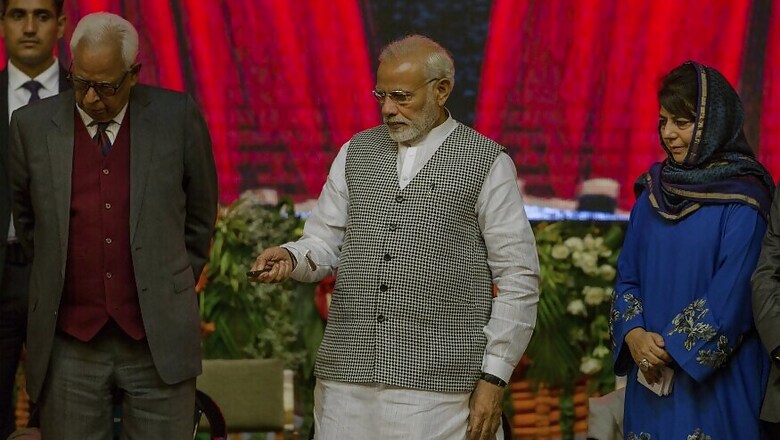
views
New Delhi: Pakistan on Monday said that it was going to approach the World Bank over the Kishanganga Hydroelectric Project (KHEP), which Prime Minister Narendra Modi inaugurated on Saturday.
Pakistan has time and again said that the project is a violation of the 1960 Indus Waters Treaty between the two countries.
Taking to Twitter, the government of Pakistan said, “Pakistan will raise its concern with World Bank today over the inauguration of Kishanganga hydropower project by India. Pakistan argues that construction of dam violates 1960 Indus Water Treaty between Pakistan & India.”
Pakistan will raise its concern with World Bank today over the inauguration of Kishanganga hydropower project by India. Pakistan argues that construction of dam violates 1960 Indus Water Treaty between #Pakistan & #India. pic.twitter.com/wx39jbHwaW— Govt of Pakistan (@pid_gov) May 21, 2018
KHEP has for long been a bone of contention between India and Pakistan. The Rs 5,750-crore project on Kishanganga, a tributary of Jhelum, was commissioned in various stages over the last couple of months.
The project includes a dam on the tributary, which is barely metres away from the Line of Control (LoC). This is not the first time that Pakistan has knocked on the doors of the World Bank. It had done so in 2016 and asked the organisation to appoint an arbitration court into the make and design of the Kishanganga dam and also look into another project on the Chenab.
The talks between the two countries, via the World Bank, have still seen no fruitful result, except the fact that India went ahead with KHEP, thus asserting its rights over the waters as well as, in ways more than one, the Indus Waters Treaty.
Pakistan, too, has left no stone unturned in asserting its rights, one of which it argues is first access to water. While it continues to object the project till date, last month, Pakistan Prime Minister Shahid Khaqan Abbasi inaugurated the first unit of the Neelum-Jhelum Hydroelectric Project (NJHEP) on the same river in Pakistan-Occupied Kashmir.
The dam will divert the Jhelum water to an underground power house. More than it being a power house and a way of transferring water from the Gurez Valley to Kashmir, the dam on Kishanganga, known as Neelum in Pakistan, is a mark of strategic significance and a show of strength.
The work on the project started during the previous government’s regime in 2007, but was halted after Pakistan moved International Court of Arbitration in The Hague three years later. Pakistan, in its plea at The Hague, had said that India violated the Indus Waters Treaty, which details the use of water when it comes to shared rivers.
In 2013, however, in a massive victory for India, the court allowed it to go ahead with the construction of the project on Kishanganga, with a caveat that it would have to release 9 cubic metres of water across the border, but Pakistan continues to protest it.




















Comments
0 comment